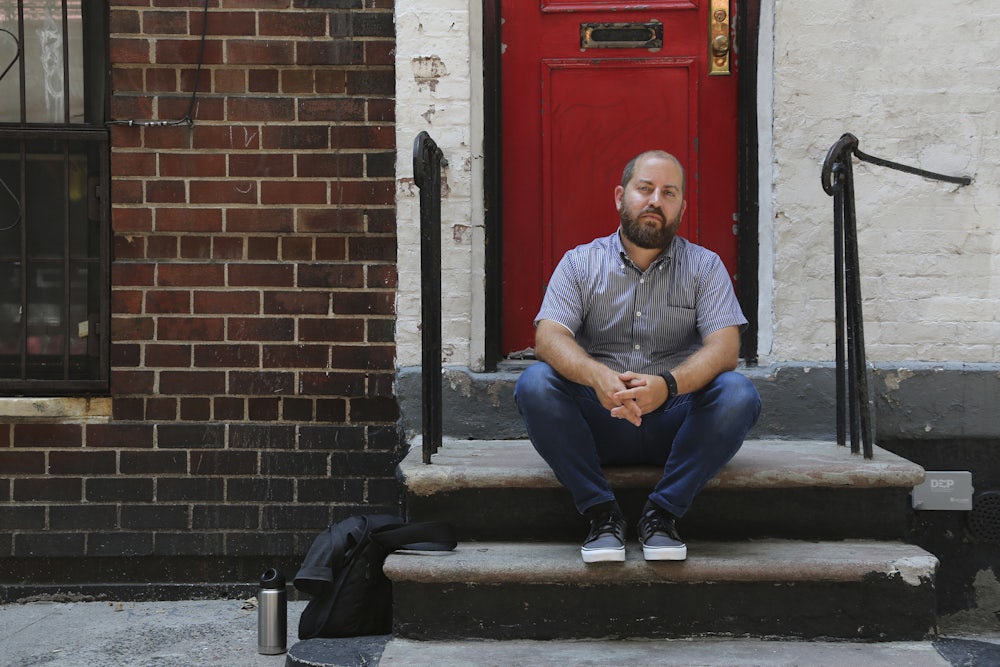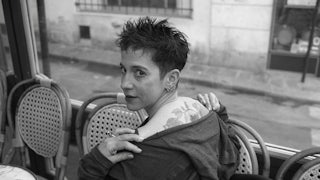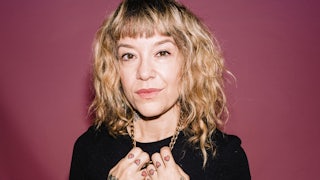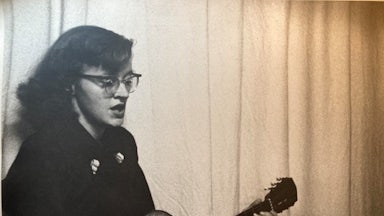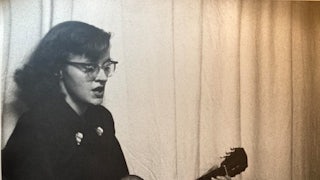Just over 20 years ago, on March 16, 2003, Rachel Corrie, a 23-year-old Palestine solidarity activist from Olympia, Washington, was killed in Gaza. An Israeli bulldozer ran her down while she was engaged in nonviolent direct action in an attempt to save a Palestinian home from demolition. In 2006, a production of My Name Is Rachel Corrie, a play based on her writings, was canceled by the New York Theatre Workshop, which claimed the decision was based on “polling of the Jewish community.” Corrie’s family pursued numerous avenues for justice, bringing lawsuits against the bulldozer manufacturer, Caterpillar, and the Israeli government and military, without success.
Bering Wilcox, a character in Jess Row’s novel The New Earth, differs from Corrie in many details, but Row aims to capture the spirit of Corrie and other solidarity activists, to whom he dedicates the novel. Like many young people, Bering is radicalized in college when confronted by challenges to the assumptions she has been raised with. But she is also one of those rarer young people for whom radicalism is not primarily an intellectual experience. Ill suited to absorbing and compartmentalizing the suffering of others, Bering views her family’s self-serving rationalizations as a profound betrayal and feels compelled to follow her knowledge where it leads her.
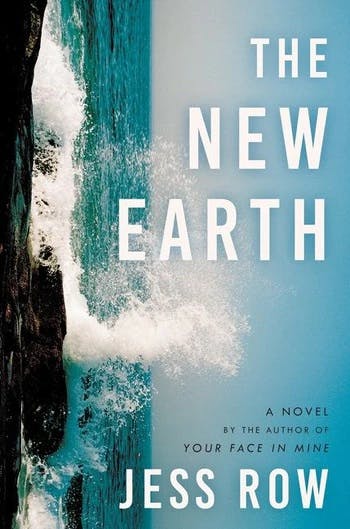
Her commitments send shockwaves through the whole family. In the novel’s present, it is 2018 and, 15 years after Bering’s death, her family has imploded. Her parents, Naomi and Sandy—hippies turned Upper West Side lawyer and climate scientist—have split, leaving Sandy suicidal. Bering’s brother Patrick has fled to India and then Germany, following a spiritually and physically ascetic path that resembles a darker version of his parents’ forays into Zen Buddhism. It is left to Bering’s sister, Winter, an immigration lawyer struggling through the Trump years, to attempt a family reconciliation by insisting they gather for her wedding to Zeno, an intellectual and carpenter with a radical family heritage of his own, who is at risk of deportation.
The novel weaves between these events, a reconstruction of Bering’s story, and the family’s deeper history. Along the way there is much talk, hyperliterate in its references but often bluntly cruel in its motivations, performing the language of self-awareness without displaying much of it. The Wilcoxes are voluble on some subjects—therapy, Buddhism, Judaism, racial identity, altruism, the climate catastrophe—and strangely silent on others. In an unfinished essay published after her death, Bering confronts the fact that the seemingly intellectual, sophisticated world she grew up in turned cartoonishly ignorant on the subject of Palestine. After her death, the family seems to talk itself in circles, talk weighed down with literary references and self-consciousness. This is a novel in which, as Sandy contemplates suicide, he contemplates the suicide of Holocaust survivor and author Primo Levi, streaming together a series of quotations on the meaning of Levi’s action. As Winter writes to her father, “There’s an element of self-congratulation in everything we do, even in our suffering. Especially in our suffering.”
This is the novel’s central political and philosophical dilemma: It’s the story of the well-to-do who possess enough of a conscience (or enough neurosis, depending on one’s perspective) to doubt their right to their own suffering. They experience Bering’s death not only as a trauma but as a rebuke to their materially comfortable if existentially anguished lives. Long accustomed to using words and ideas as tools in relationships and careers, now, in their loss, they are confronted with the example of someone who took words seriously and acted accordingly.
When the novel opens, in 2018, Sandy and Naomi are both in flight, from each other and themselves. Onetime spiritual seekers, they’ve made the familiar journey from hippiedom to bourgeois success, but nothing about them is fixed, rooted, or comfortable. Naomi has run off with a woman from her lab, but her deeper turmoil is in having had the misfortune of thinking deeply about her work as a climate scientist. Having earlier strayed out of her academic lane by writing The Shiva Hypothesis, an imagined book that posits human destruction of the planet as something willful, she knows better than anyone that there’s no safe place in which to shelter.
While Naomi and Sandy flee their miserable comfort, a pregnant Winter tries desperately to prevent the deportation of her clients and her fiancé, calling the family together for their wedding while wondering if she wants to have a child in the United States. Her life comes the closest to upholding Bering’s legacy, as she engages in a more daily and practical sort of resistance, but she’s reached a breaking point. Meanwhile Patrick stays one step ahead of his demons in Germany but is so physically fragile from years of an eating disorder disguised as spiritual practice that he fears traveling for Winter’s wedding, and the rest of his family has not met his partner and child.
Left behind, Sandy drafts his own obituary in his head as a kind of “exercise.” “At this age, you can’t say a single thing without feeling the weight of worlds around it,” he observes, and plans a return to the site of a Zen Center where he and Naomi had lived years before. Among his musings, he remembers the email he and Naomi sent months after Bering’s death, withdrawing from the public eye:
Chosen a day. Call it the beauty of the refusal, the beauty of saying no more. Naomi and I have decided to withdraw from the arena. Not to continue the appeals, not to establish a foundation in Bering’s name, though we’ve been asked to be generous friends, and not to grant any more interviews to the press. Because nothing we can do will change the events of March 13, and for the health of our family we need to mourn and recover in private.
This turn inward—a direct reversal of the choices made by Corrie’s family—is a fatal one, and a telling choice by the novel. Such a public death could never be mourned entirely in private—and, as Naomi and Sandy know, it’s not what Bering would have wished. When the family travels to Israel and Palestine following her death, Winter tries to persuade her parents to seek justice. “We’re supposed to be shattered. We’re not supposed to go on.” Sandy insists that they are incapable of picking up the fight, to “sail the seas of outrage for the rest of our lives” and that if Winter carries on without him, the divisions within the family will become the legacy.
But it is this turn away from the possibility of commitment and solidarity, Row suggests, as much as the trauma of Bering’s death itself, that pulls them apart, transforming The New Earth into a novel not about the costs of political commitment but about the price of fleeing from necessary battles.
Bering’s commitment is born of a connection across difference. The theme of this connection—especially for Jews—is one Row has explored throughout his work. His first novel, Your Face in Mine, explores the improbable success of a white Jewish man who undergoes “racial reassignment surgery” and passes himself off as Black. The New Earth presents us with Naomi, conversely, finding out her biological father was Black, only to hide the knowledge from her children for many years and then resist the idea that it should reshape her. Her grown children, more fluent in the contemporary language of identity, insist that she—and perhaps they—are “really” Black or at least biracial, but have little sense of what that might mean. Eventually, Naomi connects with Tonya, her biological father’s granddaughter, who has read about Bering online and admires the cousin she never met.
It’s unclear, however, how these stories intersect—are we meant to contemplate the parallels between racial identity in the United States and the ideologies of Zionism and anti-Zionism? Is Naomi’s rejection of Blackness a part of the reason for her failure to live up to Bering’s legacy? Late in the novel, we read an unfinished essay by Bering titled “Palestine: On the Poverty of Metaphor,” in which she argues for a clearheaded assessment of the injustices of occupation, away from the imposition of meaning through the lens of family psychodrama. Yet the novel itself, by its very ambition and learnedness, seems drawn back into the politics of metaphor and analogy. Other storylines, such as Naomi’s one-time affair with a Zen master, her lawsuit to win tenure, and Sandy’s entanglement with a client who fraudulantly claimed to have recovered art stolen during the Holocaust, come to feel like sidelines—enacting rather than diagnosing the Wilcoxes’ desire to distract themselves.
The most powerful section of the novel comes midway, when these stories are paused as a range of characters recount the events leading to and directly after Bering’s death. Rather than the fragmentary retellings we often get in emails and text messages throughout the novel, here the characters testify directly to the reader. Bering speaks of her love for Heba, the mother of the family she dies defending, who is killed alongside her. Sandy recalls directly the pain of his closest friend condemning Bering’s action. And we hear from Yoav, the 19-year-old soldier who kills her, who begins by noting, “You already know the answer to every question you could possibly ask me,” and cynically invokes his imagined audience’s presumed sympathy for Palestinians against them: “Why aren’t you talking to Aron, who was lying right next to me, who killed the Arab girl? I’ve forgotten her name.” Against all the novel’s eloquent talkers and theorists, he asserts: “I have no opinions … I have no theory or inspiration to share with you.” Here among all the talk is the raw face of power, without gloss or metaphor, the thing that needs no justification but itself.
“And what is wrong with their life? What on earth is less reprehensible than the life of the Levovs?” Philip Roth’s 1997 American Pastoral, another novel of a Jewish family coming undone in the wake of an act of political radicalism, ends with this unanswered lament, the final cri de coeur of Seymour Levov, the father whose daughter Merry has rejected his charmed assimilated life of upward mobility and embraced radicalism. It was the cry of countless liberal, affluent parents who experienced their children’s political commitments as a betrayal not only of their values but of their very being, their aspirations for the good and stable life. It’s a question no one would ask of the Wilcoxes.
For all their disagreements, none of the Wilcoxes believe in an idyllic apolitical life. They know their world of upward mobility, assimilation, professional aspirations, and middle-class security has faded and, in what feels like something of a miracle, seem ready to stop raging against the dying of the light and, as a Boomer sage once put it, get out of the new one if they can’t lend a hand. They even give up their Upper West Side apartment, giving it to Tonya. At Winter’s wedding, Naomi laments the world left to her children and expresses joy at their exile, as Winter and Zeno head for Mexico, and Patrick returns to Germany.
In Row’s vision of the Trump era, there is no American pastoral to return to, long for, or even to mourn; there is only the hope of escape and of freedom from illusions. “Your lives will be worse than mine,” Naomi tells her children at the wedding. “It’s a long tailing off, a long diminishment from this point. But at least you know that. You know yourselves so much better than I ever knew myself.… I can say, as a blessing, that your lives will not be like our lives. I think, wholeheartedly, that’s a good thing.”
What has Bering’s example left for this next generation? Where is the possibility of solidarity and action? Sandy’s law partner invokes Roth’s novel to convey how mystified he is by Bering’s death. Her protest, he tells Sandy, was “something out of another era, like the Weathermen bombing, the town house in the Village, or Lori Berenson, that girl in the Shining Path. Like that novel you gave me, American Pastoral.” Sandy rightly objects to the comparison by pointing out that Bering was armed only with a video camera, but the objection goes deeper.
Against this ritual use of the 1960s to dismiss all new forms of radicalism, against the sneering dismissals by the comfortable of any attempt at solidarity—as “radical chic” in the parlance of one era, as “virtue signaling” in ours, as mere guilt about privilege, as self-hatred, and so forth—The New Earth suggests the question Sandy can’t quite articulate: not, why would Bering, or why did Rachel Corrie, take a radical leap toward solidarity, but, rather, why don’t more of us?
